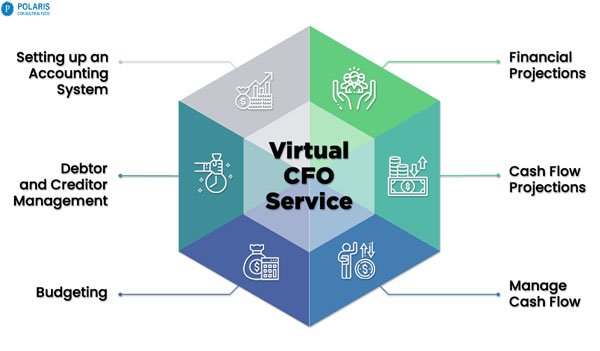
How Technology Makes Virtual CFOs More Effective Than Ever
In today’s fast-moving business world, managing finances effectively can be the difference between thriving and just surviving. But hiring a full-time CFO isn’t always feasible—especially for small and mid-sized businesses in the U.S. That’s where Virtual CFOs step in.
And it’s not just about remote convenience—technology makes Virtual CFOs more effective by enabling real-time data access, smarter forecasting, automation, and seamless communication. In this blog, we’ll explore how technology has revolutionized Virtual CFO services and why your business should take advantage of it.
Why Technology Makes Virtual CFOs More Effective Today
The CFO role has transformed from traditional, in-house number crunching to cloud-powered strategic advising. With powerful fintech tools, today’s Virtual CFOs can access financial data from anywhere, automate reporting, and provide insights that are faster and more accurate than ever.
In short, technology makes Virtual CFOs more effective by enabling them to act not just as accountants, but as strategic partners who guide growth.
Top Technologies That Make Virtual CFOs More Effective
1. Cloud-Based Accounting Software
Platforms like QuickBooks Online, Xero, and FreshBooks allow Virtual CFOs to access real-time financial data 24/7. Whether it’s reviewing cash flow or generating reports, cloud-based accounting is the foundation of tech-powered CFO services.
2. Financial Dashboards & KPI Tools
Apps such as Fathom, Live Plan, and Float help visualize financial health using live dashboards. These tools allow Virtual CFOs to monitor key performance indicators (KPIs), offering instant clarity on what’s working—and what’s not.
3. Automated Bookkeeping & Expense Tracking
Tools like Debt, Hebdo, and Auto Entry use AI and OCR technology to automate data entry, categorize transactions, and reduce human error. This frees up time for higher-level financial strategy.
4. AI-Driven Forecasting & Scenario Planning
Modern CFOs use AI-based tools to create accurate financial forecasts, simulate best- and worst-case scenarios, and prepare businesses for unexpected financial shifts.
5. Secure Cloud Document Management
Services like Google Drive, Dropbox, and OneDrive provide safe, encrypted file storage and easy document sharing. E-signature tools like DocuSign streamline contract approvals and audit trails.
6. Video Conferencing & Communication Tools
CFOs stay connected using Zoom, Microsoft Teams, or Slack, making communication with leadership teams seamless regardless of location.
5 Key Benefits: How Technology Makes Virtual CFOs More Effective
1. Real-Time Insights
Technology enables Virtual CFOs to offer up-to-the-minute insights into revenue, expenses, and financial performance—crucial for fast decision-making.
2. Improved Accuracy
Automation reduces manual entry and errors, ensuring books stay clean and compliant without hours of tedious work.
3. Faster Reporting
With cloud systems and integrated dashboards, monthly close and financial reporting become significantly faster—sometimes just a few clicks away.
4. Scalable Services
As your business grows, a tech-savvy Virtual CFO can scale services by integrating new tools, without needing more in-house staff.
5. Cost Savings
Compared to hiring a full-time CFO, technology allows Virtual CFOs to deliver expert-level support at a fraction of the cost—often on a flexible, retainer basis.
Real-Life Examples: How Technology Makes Virtual CFOs More Effective
📍 San Francisco Tech Startup
A growing startup leveraged a Virtual CFO to track its burn rate using Live Plan. The result? Investor-ready financial models were completed within days, not weeks.
🛒 E-Commerce Brand in New York
Using QuickBooks Online integrated with Shopify, a Virtual CFO automated inventory reconciliation and streamlined monthly reports.
🏗️ Construction Company in Texas
By adopting cloud-based job costing tools, a Virtual CFO helped manage contractor payments, track project profitability, and maintain compliance with labor laws.
How to Choose the Right Virtual CFO for Your Tech-Driven Business
To make sure your business gets the best value, ask potential Virtual CFOs:
-
What accounting, forecasting, and KPI tools do you use?
-
Can I access live dashboards and reports anytime?
-
How do you ensure data security and compliance?
A truly modern CFO will offer not just financial oversight, but a technology-powered system that evolves with your business.
Final Thoughts: Why Technology Makes Virtual CFOs a Smart Investment
From automation to AI-powered insights, it’s clear that technology makes Virtual CFOs more effective, efficient, and essential than ever. For U.S. businesses looking to scale strategically without the overhead of a full-time finance team, this is the smartest move you can make.
So, if you’re ready to make better financial decisions, save time, and gain a competitive edge—partner with a Virtual CFO who understands and leverages technology.
